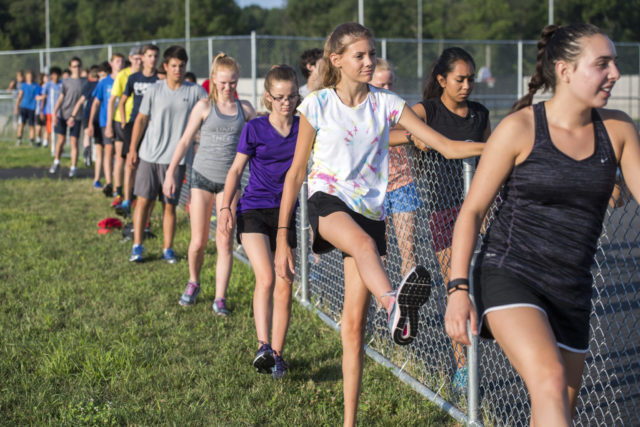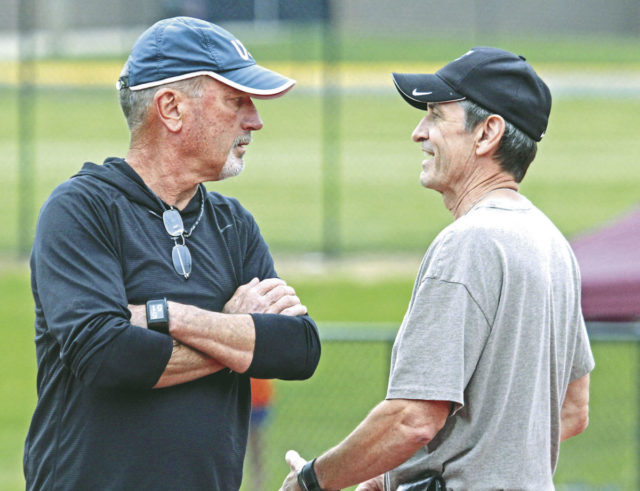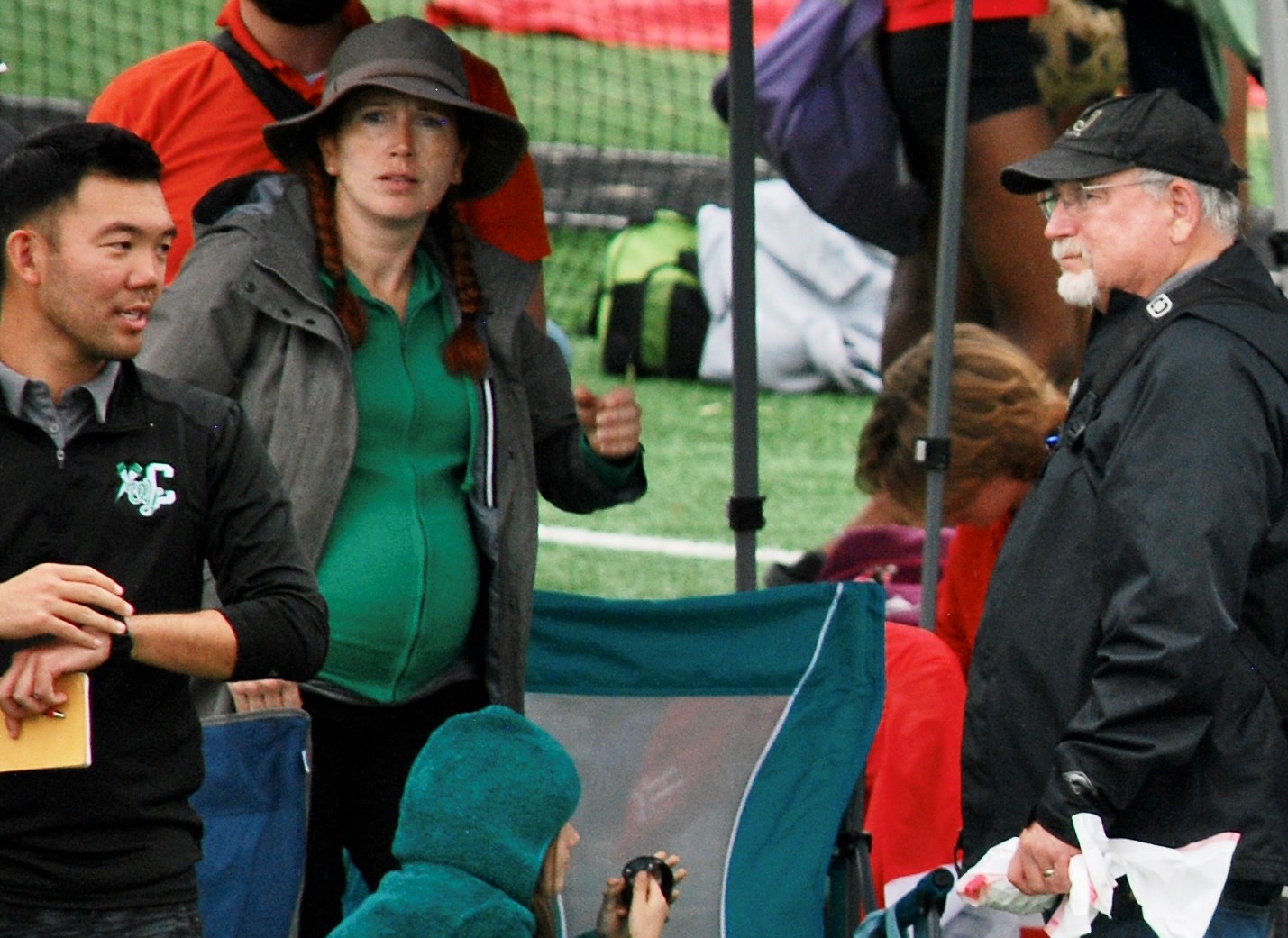
New School, New Team, New History
When Charles J. Colgan, Sr. High School opened last year, there were no championship banners hanging in the gymnasium. No trophies lined the trophy cases. No records existed to be broken by ambitious younger generations. Traditions, legends, the stuff of student mythology was yet to be written. So when administrators chose to field a varsity cross country program in the school’s first year, there was only potential before them.
They hired Dave Davis and Bill Stearns, two of the most accomplished coaches in local running, to build their team. Davis was a 2012 finalist for the Brooks Inspiring Coaches award and was inducted into the Virginia High School League Hall of Fame in 2011. He has won seven state titles to Stearns’s five. Stearns, for his part, has coached a Marine Corps Marathon winner, state and national champions, and All-Americans across his career. With Davis’s longtime assistant coach Melissa Tirone rounding out the leadership, they formed a kind of coaching dream team. Their task? Develop their athletes until they could challenge any of the other eleven schools in Prince William County.
Davis was right at home in the new halls, having built teams from nothing four times before. Stearns had tended towards floundering teams that he could transform into powerhouses, then spent over a decade as the Athletic Director at Potomac High School. On the side, the duo recently took over coaching duties for the All-Marine Running Team. Neither coach sees winning as his job, exclusively, but they’ve certainly been known to do that.
The students who came out for cross country in the 2016-2017 school year had no one to look up to and no idea what they were in for. At 14, 15, 16 years old, these young athletes didn’t know that their coaches had been training champions since before they were born.They only saw three adults invested in their well-being and progress, who ribbed and respected each other in equal measure, and who aimed to build well-rounded athletes with strong character who will succeed far beyond high school. It was enough. One by one, the youth embraced the sport, the challenge, and the struggle to grow from seed.
Gabby Layne, Colgan’s top female finisher at their conference championships last year, is a budding leader and one of very few students who chose to transfer to Colgan. Her younger brother was assigned to the new school, and after two years running track and cross country for Osbourn Park, Layne saw an opportunity to reinvent herself.
“Before I came to Colgan, I wasn’t really outgoing or anything at all,” she recalls. “But when I decided that I was going to go to a new school, I said, this is a new opportunity. I knew that the team would have to be worked on and we’d have to build our own team, and so I told myself that I was going to get the team to know each other.”
Their early practices were tough. Everyone tells the same story: on the first day, the coaches asked the team to run out and back. “See what you can do,” they said. The students departed into the nearby woods. Out of sight of their coaches, Layne recalls nearly half of them walking. Stearns caught up with them easily.
“You run?!” The students marveled.
“Yeah, I guess you don’t!” Stearns taunted.
The coaches laugh to tell it now, but it was a moment of accountability for the new team. The coaches were watching. They expected more of their athletes and they’d be beside them to make it a reality.
Having two years more experience than her teammates, Layne would often run ahead at her pace, then circle back to greet and encourage others. Some of them, she recalls, “They’d just nod their heads and kept going at the same speed.” Others would pick up their pace. “They became competitive and wanted to do better,” Layne said. “It was a great feeling because you know you’re empowering others.” Plus it gave her company until Stearns connected her to train with competitors from Potomac High School.
Though this could have created a rift in the team, Layne made it a point to learn every runner’s name “so that I could cheer for them on the sidelines whenever we were running.” She enjoyed seeing her friends’ reactions to courses she knew well, and she feels confident in the rapport between her teammates.

Let Leaders Emerge
Without full junior or senior classes, Colgan’s younger athletes are at a disadvantage. They don’t have peers reinforcing the team’s values or modeling what’s possible with hard work and patience.
Long ago, Stearns adopted a policy of never naming captains by royal decree. He would see which students took on those responsibilities and let the leaders emerge from the grassroots. They were not always the fastest runners. Rather, the were the ones that teammates admire and enthusiastically follow. With a sparse and unknown senior class, Davis and Tirone embraced the plan out of necessity, and then with enthusiasm.
Layne is an obvious example of a student rising to fill a leadership void. Stearns recalls another who once blossomed under this system: Brian Letendre never led the pack but he made friends and motivated his teammates at Potomac High School. After college, these traits led Letendre to the Marines, where he was deployed to Iraq once and later volunteered to return. Emotion creeps into Stearns’s voice here: in 2006, Letendre was killed when suicide bombers attacked his post in Anbar province. Stearns has no doubt he was behaving as he always did, protecting his team in his final moments.
Make Every Runner Better
When they say they want to make every runner better, the coaches are taking a broad view.
“For some kids, that will be being a state champion or going to nationals,” says Stearns. “For other kids on the team, that will be being better as a senior than they were as a freshman.” Both goals are valid and the coaches will work with students to help them do their individual best.
Ultimately, Stearns says, “It’s nice to be a great athlete, but you want people to respect you and to appreciate you.”
Student athletes face competing priorities, demanding schedules and big life decisions looming before them. These challenges don’t disappear just because their desks are unscratched and the floors unscuffed. School records might be easy to come by early on, but Stearns believes that runners who learn persistence and patience succeed later in life. In particular, he says, athletes who never reach the podium often become doctors and lawyers, professions that require hours, days, years of diligent work without reward.
At the urging of their coaches, Colgan’s athletes are well-behaved, well-liked, academically motivated students. Stearns thinks this approach should be self-evident, but has seen schools allow talented athletes to misbehave and coaches push for victory at their players’ expense. Ultimately, the Colgan coaching team believes its role is to build well-rounded athletes of strong character.
“We feel that being a good athlete comes, well, after being a good person,” he says.
The Future of the Team
At the Virginia 6A Conference 4 Cross-Country championships last fall, the Sharks inked their motto–Fear the Fin–on their calves, and junior exchange student Antonio Lopez blazed to a first place finish, later going on to place ninth at the state meet. His teammates performed well enough to finish 4th and the girls 5th in their conference, a respectable beginning for a group that could hardly run ten minutes at the beginning of the season.
This summer, the Sharks have been building their base, hoping to start the season as strong as they finished last year. Many of them ran track or competed in other sports during the school year, maintaining their fitness in the long winter months. Layne looks forward to incoming first-year and transfer students to fill out their ranks.
“I just hope that we keep our work ethic up,” she says, “that we continue to do what we’ve been doing, and to be dedicated and eating right and getting sleep throughout the year with all the tests and exams that go on.”
The coaches’ goals remain equally modest. Davis outlines a simple target and its aspirational ripples: “The emphasis is on improving the athletes so we become competitive so we have the opportunity to compete at some point in time for a title or a championship or even an individual title.”
They will continue with their athlete-oriented approach and see what comes of it. The athletes will benefit from their coaches’ decades of success and from their emphasis on process and relationships.
In sum, “Winning takes care of itself if you take care of the athletes.”
And the team did win in its first year, and will likely win more as its athletes progress. The banners, trophies, and plaques will come, as they will in other sports over time. But that will always come second to building a strong work ethic and running family on the Colgan teams.
Recent Stories
Looking for our race calendar? Click here Submit races here or shop local for running gear
Losing to Live 5K Run & Walk
WHEN Saturday, June 14, 2025 at 9:00 am WHERE This convenient location is just minutes from your house located 1/2 mile inside the 1-495 Capital Beltway at exit 51. Spectators are welcome to watch and cheer on the runners. Capital
Zebra Dazzle 5k Walk/Run or 100 Bike over 30 Days
Join the Zebras for this Zebra Dazzle event for all fitness levels. The 5k Walk/Run has 2 options. You can participate as an onsite participant on 9/13 at Carter Barron in Rock Creek Park, NW Washington DC or as a






